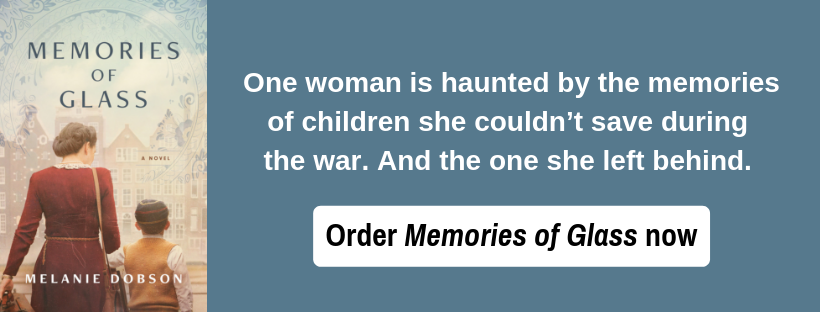Memories of Glass (available September 3rd) by Melanie Dobson is a novel that tells the story of two fictional characters who helped save others while risking their own safety. In the piece below by Melanie, learn about real life heroes who put their own lives on the line to rescue others during the dark days of World War II.
Several years ago a dear friend told me about thousands of Dutch mining tunnels in Maastricht that were used to hide people and artwork during World War II. As I researched those tunnels, I stumbled onto the incredible story about a network of seemingly ordinary people in Amsterdam who rescued more than six hundred children from a Nazi deportation center during the war. This amazing feat became the foundation for Memories of Glass.

During my months of research, I read countless interviews with men and women involved in the Dutch resistance and then spent a week in the Netherlands visiting all the major locations for my story, including the Amsterdam deportation center and the marlstone tunnels down south. When I boarded a bus to Kamp Westerbork, the elderly driver was so pleased to hear I was writing a novel about Holland’s Holocaust that he covered my fare. Across this beautiful country of windmills, canals, and fields of flowers, I discovered a number of gracious people like this gentleman who were eager to share what happened to their ancestors during the war.
Real-life heroes who banded together to save others
Walter Süskind was a German Jewish salesman appointed to register each man, woman, and child forced into an Amsterdam theater for deportation. Across the street from the theater, separated by a tram line, were two brick-clad buildings—a day care run by a matronly Jewish woman named Henriëtte Pimentel and the Reformed Teacher Training College, overseen by Johan van Hulst. These three leaders partnered together to rescue six hundred children from their vigilant occupiers, and the Nazis never found out what they were doing.

Sadly Henriëtte was killed at Auschwitz in 1943 after accompanying her staff and the remaining children in her care. Walter was exempted from deportation, but his wife and daughter were not. He chose to leave with them and many think he was killed in 1945 by fellow inmates at Auschwitz who thought he, a former employee of the Judenrat, was a traitor. Dr. Hulst passed away last year at the age of 107. He knew that I was writing Memories of Glass, and it was a great honor for me to connect with those who loved him.
Heroism, rescue, and the heart of Memories of Glass
The heart of Memories of Glass is about two Dutch women who’ve been wounded by a broken friendship. When the Nazi occupation brings them back together, they must work closely together to rescue the Jewish children in their care.
My hope is that the friendship and sacrifice of these women will represent the thousands of Dutch men and women who gave their lives for people they loved and often for people they didn’t even know. Memories of Glass poured out of me as a reminder that in my own small world, my busyness, I often overlook opportunities to help others around me. I hope readers are inspired alongside of me to be vigilant in sacrificially loving those whom God brings into our world as well as, like Landon in the story, be open to stepping outside our comfort zones to partner with people in need around the world.

Memories of Glass by Melanie Dobson
Reminiscent of Diane Ackerman’s The Zookeeper’s Wife, this stunning novel draws from true accounts to shine a light on a period of Holland’s darkest history and bravest heroes.
1942. As war rips through the heart of Holland, childhood friends Josie van Rees and Eliese Linden partner with a few daring citizens to rescue Eliese’s son and hundreds of other Jewish children who await deportation in a converted theater in Amsterdam. But amid their resistance work, Josie and Eliese’s dangerous secrets could derail their friendship and their entire mission. When the enemy finds these women, only one will escape.
Seventy-five years later, Ava Drake begins to suspect that her great-grandfather William Kingston was not the World War II hero he claimed to be. Her work as director of the prestigious Kingston Family Foundation leads her to Landon West’s Ugandan coffee plantation, and Ava and Landon soon discover a connection between their families. As Landon’s great-grandmother shares the broken pieces of her story, Ava must confront the greatest loss in her own life—and powerful members of the Kingston family who will do anything to keep the truth buried.
Illuminating the story and strength of these women, award-winning author Melanie Dobson transports readers through time and place, from World War II Holland to contemporary Uganda, in this rich and inspiring novel.

